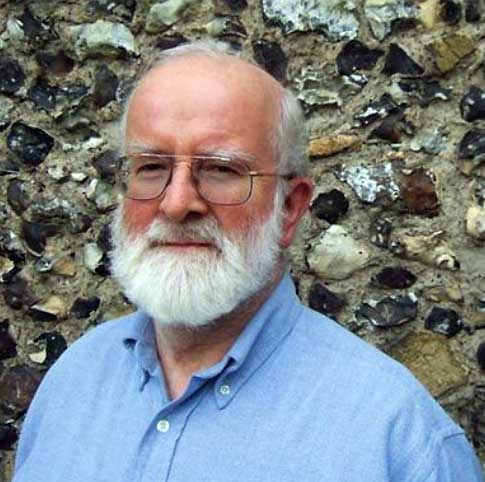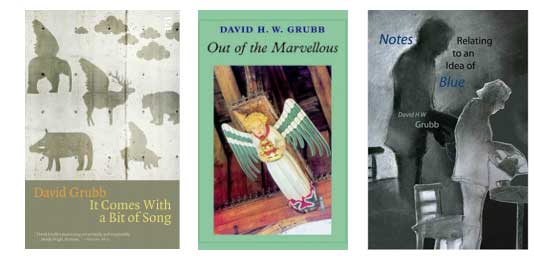‘There are three elements central to all my poetry and prose:
celebration, wonder, and discovering’
– David Grubb, 2009

David Grubb was born in 1941. He worked as a psychiatric nurse, a teacher and headteacher, and for Barnados. Aghast at the fact they had several press officers simply for the royal family (in relation to the charity) he left and set up his own charity, Children’s Aid Direct. This charity was hands on, and money for staffing and administration costs was raised separately from normal donations. David often convinced lorry drivers from Reading, near where he lived, to make a trip to Bosnia or Kosovo to deliver aid; he often accompanied them, clad in a flak jacket, and wrote all the charity’s news reports and publicity material.
This writing could be persuasive, shocking and informative, but it wasn’t just about reports, news and charity work. David was a writer throughout most of his life: novels, books of poetry and an inventive autobiography, along with letterpress editions and thousands of appearances in poetry magazines and anthologies. He believed in the power of the arts, was sure that refugees, orphans and those otherwise affected by disaster and conflict needed to play, dance and tell their stories as much as they needed food and shelter. Aspiring authors too: in later years, having ‘retired’, he became a writing tutor and mentor.
His poems dealt with people, be that memories of his parents, those he met in passing, other poets, historical figures, the insane and those disregarded by society. He had strong spiritual beliefs but did not preach at others, was open to debate, conjecture and the impossibilities of belief and faith.
In addition to those who inhabited his writing, he was a dedicated husband, father and grandfather. That dedication included several years of caring for his wife, Beverley, before she had to spend her final days in a home. Ironically, David would also move to a home so his dementia could be monitored and he could be looked after. He died peacefully on Easter Monday, 2024.
•
Over the years he and I had not only a publisher/author relationship, but also a friendship and a dialogue in poems, where we would write back to each other’s poems that struck us, usually as new poetry collections were published. The poem below, written back in the mid 2000s, questioned the fact that David’s poems could be so bloody emotional, so moving. Was the reader being manipulated? Were poems like this a kind of propaganda rather than reportage? Was writing poems with the aim of reader empathy a good way to write? I had to read his work, however: he had asked me to by gifting me a book, and I could not help but return to one specific poem over and over again, resulting in this poem.
David and I met many times, and I was able to help him advertise his charity and assist in several one-off projects. I also read with him on many occasions, and enjoyed drinks and chats with him after. But as the poem below says, it is his reading voice I shall remember, wrapping listeners in a strong, assured musical language as he spoke of the neglected, the angelic, the hurt and forgotten.
THE POEM I DO NOT WANT TO READ
for David Grubb
This is the poem I do not want to read
but you asked me to. The one that
is more than language, that cuts
through the crap and makes me cry.
I hope you are proud of what you
have done, have made poetry do?
I prefer linguistic puzzles and games,
do not like to be upset or reminded
of what can be said or how to say it.
This is the poem I do not want to read.
It arrived in a book full of angels
and light, orchards and relatives,
ghosts from your past. The wars
you have been to revisited, along
with the madness you’ve seen.
I would rather not be told about
these things. How dare you
make words so meaningful.
This is the poem I do not want to read
but felt I ought to. Out of the marvellous,
toward epiphany, angels sing and words
are on fire, if you catch my meaning.
Or rather, if I catch your meaning, the
drift of where you are going. Where
are you going? The memory room is
no place to live – the past will fade,
the only view is next year’s rain.
This is the poem I do not want to read.
Our church clock won’t be wound up
ever again – it’s electric, plugged in
to the mains. The orchard you remember
has been felled, they don’t make cider
with apples any more. We all have our
individual methods for pushing away
what we don’t want to know, and this
is mine. Silence may tell stories but
this is the poem I do not want to read,
the poem that saves me talking to myself
or others, that gets through nostalgia to
the heart. It is the poem that says look,
I am here and bathes in full moon’s light.
But when clouds confuse the moment
and it is impossible to read in the dark,
I am forced to remember you speaking
this poem that I do not want to read.
Rupert Loydell

.

Pleased to see this tribute as I didn’t know about David’s charity work and your writing friendship. Sorry you’ve lost a friend.
Comment by Tilla on 19 April, 2024 at 7:58 pm